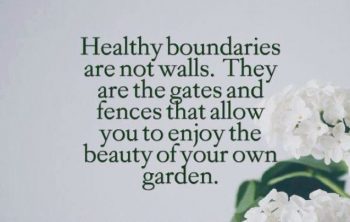November 20th, 2017
By Susan Hassen
Guest writer for Wake Up World
As an energy healer, I have worked extensively with clients who have come to me with blocks around setting boundaries and trusting the boundaries they set. Many of the clients I work with are very sensitive to energy and easily absorb the energy of people around them, so I refer to them as “empaths.” While difficulty setting boundaries is not unique to empaths, it is empaths who often have the hardest time setting boundaries and speaking up when a boundary has been crossed. Sometimes an empath can be so overtaken with another’s energy that they are unaware of how much of their will, power, and energy they have given away — so there are many lessons we can learn from their experiences.
When we don’t check in with ourselves, we don’t know a boundary has been violated till after the fact. Often, we fail to set small boundaries that lead up to offensive violations that call us to set major boundaries at times where we’re not used to using our voices. This can make us feel helpless and completely void of our personal power. We can take back our power as soon as we realize that we are always in control of ourselves, and by setting boundaries, we can assure that we honor what feels right in our bodies.
[pro_ad_display_adzone id=”110028″]
The key to knowing when a boundary is violated is by listening to your emotions. Listen to the feelings that come forward and the physical reaction you get in your gut. When you listen to your emotions and practice feeling them, you will be able to better tell when a boundary has been violated.
Betraying a personal boundary happens when you ignore the emotions that are trying to guide you, and you find yourself saying that you knew better, that you felt uneasy about a decision, or you knew it wasn’t coming from you. One can often feel anger, shame, or embarrassment after this happens. It is important to understand that the experience of betraying a personal boundary, or having a boundary crossed by another, is an experience in growth and learning that every soul needs and wants to have. This is part of the journey, and it is nothing to feel bad about or judge yourself over. We are given an infinite amount of chances to act from our inner wisdom.
When we don’t act from our inner wisdom we feel the heaviness and compression in our body. Self-betrayal is an indicator that we lack the courage that is required for self-love. When we have self-love we can trust what we are feeling and let it guide us even if it displeases or loses the approval of others. Self-trust is an important initiation into self-love that our souls are here to learn, these two states are intrinsically linked and boundaries are one of the ways through which we learn.
Only you know what your authenticity feels like and when you’re not living from it.
The more we feel our emotions the more we are able to identify what they are communicating to us.
For example, growth doesn’t always feel comfortable, in fact it rarely feels comfortable, so not every uncomfortable emotion we experience is a sign that our boundaries are being violated when it could be an indication of expansion occurring in that moment. That’s another reason why it’s important to be able to determine between the need for a boundary to be put in place or whether we are breaking through uncomfortable barriers and expanding our perception. Only honest self-inquiry will be the way to tell for sure.
What you honor on the inside is what will show up on the outside. When you respect yourself, you show other people how you would like to be treated, and you also mirror back to them how to respect and love themselves. It’s a domino effect that the world needs. If we want to live on a planet that respects and honors life, we have to set the example by how we treat ourselves and how we allow others to treat us.
I invite you to change the way you think about setting boundaries. If you’re afraid of confrontation or engaging in a toxic dynamic, then your boundary can be set through the energy you withdraw from a situation or pattern. Now if you are in a violent or abusive situation, this is something that requires you to take action by seeking protection or moving to a place of safety or distance. Standing up for yourself is an essential boundary and you will know when you need to do so. Allow yourself to be creative when setting boundaries by addressing the issue from a new perspective; one that you haven’t tried before or seems too simple to work.
For example, a boundary we may not always think of is silence. Silence is a powerful boundary. Not giving your energy to situations and people that drain you communicates that you are no longer taking part in someone else’s inner turmoil. In this age of fast communication via texting, email, and social media it is easy to get pressured into forced interactions. We can remedy this by not responding and making them wait in order to communicate a need for space and reflection. We cannot let others arm-wrestle us into interactions we don’t want to give our energy to. Silence can communicate: I am not going to leave myself to entertain your chaos.
We can set boundaries through our actions via what we don’t say, but most of the time we need to vocalize our boundaries. What we voice into reality is very important, especially when confronting people who think you don’t have a voice or who don’t want you to have a voice. We reclaim power through our voice anytime we have been silenced or afraid to use it. We reclaim lost aspects and parts of our soul who weren’t allowed a voice. We speak for our ancestors who weren’t able to say the things we are able to say today. We heal past lives and clear karma just by speaking up for ourselves and occupying our space.
Change is another boundary that can be seen by our actions. People expect us to act a certain way; perhaps in the way they’ve been programmed to act and what they expect out of you. When you change the way you act or go about doing something, or make a major life change, it sets a boundary of personal freedom. It says that you have taken control of your life and you are not going to bend to the expectations that have been put on you since birth. Doing things your way, even if you are doing it alone, is not only a boundary, but also a declaration of freewill.
Decision-making is also a boundary. If you feel pulled between two choices that you need to make, making a decision sets off a course of action for what you choose to create and what you stand for. Believing and trusting your actions helps establish a boundary, while standing by your decisions is the boundary. Moreover, if you are in a situation where you are dependent on another person’s choice, taking the initiative and making a decision sets an important boundary in establishing your voice, preferences, and your confidence in steering the course of events in your life.
Being yourself is the ultimate boundary. It is the highest act of self-love and worthiness. It is announcement to the world that it must negotiate itself around you because you are not the one that will be compromised.
Confidence is a boundary. It is a state of harmony where you have made a decision, and follow through with it using your actions and words.
Even seeking clarity on an issue (or seeking clarity prior to making a big decision) is a boundary because you are questioning what is being presented to you and defining and understanding it to meet your needs. You are the gatekeeper to what you let into your life, and anything that helps you sift through the dirt is a boundary that will help you find the gold in any situation or experience.
The important thing is to try to not over-intellectualize boundaries and what will happen next if we make them or if we don’t. This all stems from a fear of punishment that will be suffered for creating a boundary (which is a good indication you probably need to create that boundary). Try not to get caught up in a storm of thoughts that cause you to distrust your actions. We need to learn how to make decisions and set boundaries based on how we feel, and to do that, we need to master trusting how we feel. When you are in control of boundaries, you get to determine how far you need to expand them or when you no longer have to consciously set them.
When you trust yourself, you allow your own energy field to be the boundary that people respond to. When we are confident, grounded, and connected to our feelings, we allow our energy to introduce ourselves, and we allow ourselves all the room we need to honor our personal truth and the boundaries that reinforce our self-respect.
Also by Susan Hassen:
- Inner Child Work: The Missing Piece in the Spiritual Evolution Puzzle
- Grounding: The Gift of Being in Your Body
About the author:
Susan Hassen is a Quantum Sphere Healer, emotional counselor, author, activist, and Juris Doctor. She runs the blog CosmicArcheress.com where she uses her background in higher dimensional healing, emotional body and energy body work to assist humanity in our spiritual evolution.
You can contact Susan via:
Website: quantumspherehealer.com
Blog: cosmicarcheress.com
Instagram: @quantumspherehealer
[pro_ad_display_adzone id=”110027″]








